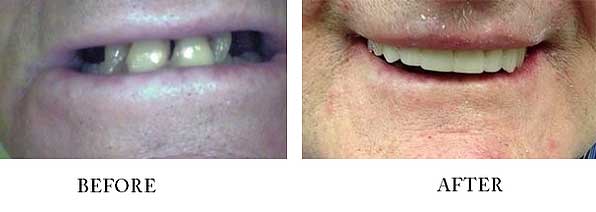We first saw Bob as a patient for an implant consult after going years with the process of losing one tooth at a time due to decay, breakage, gum problems, etc.
Bob underwent several procedures to regain his smile. We removed the remaining teeth on the upper and lower jaws that had problems. Eight upper dental implants were placed, and an implant-retained bridge was placed on top. Four dental implants were placed on the bottom to retain an implant overdenture (implant-supported denture).
Why was Bob a good candidate for these procedures?
Bob was the ideal candidate for this procedure as he was missing multiple teeth, was in good general and oral health (despite a previous smoking history), and was vehemently opposed to wearing a removable prosthesis (denture) as a replacement option, especially on the upper jaw.
How did we develop a plan for treating Bob’s concerns?
Bob’s main concern was having teeth that look and feel like his own again. He did not want to deal with the many problems associated with long-term denture use, as he had heard many negative stories from friends. He was also concerned about his chewing ability and wanting to be able to eat solid foods (hard bread, steak, etc). Having researched, Bob knew that dentures rely on other adjacent teeth’ support and do not preserve the underlying jawbone. Dental Implants can maintain the bone and improve comfort, aesthetics, and function without relying on support from other teeth.
What are the steps involved in this case?
- Examination of the patient’s x-rays, oral health, and medical health. A CT scan was obtained before any dental implant procedures. This allowed us to know precisely where to place the implants before surgical work.
- The remaining teeth were removed, and a denture was given to the patient during the first three months of healing for the upper and lower jaw. Dr. Mark Bishara placed twelve dental implants into the jawbone, allowing the implants sufficient time for healing and integration with the bone.
- Dr. Mark Bishara attached abutments or posts to the dental implants, and a digital impression scan was taken using the iTero 3D system.
- The fixed bridge with new teeth was cemented and attached to the top of the posts.
- A new lower denture was made to attach to implant denture posts on the bottom.
Am I an ideal candidate for a dental implant procedure?
The ideal candidate for a dental implant procedure is anyone in general good health and has adequate jaw bone to support an implant. There are no age restrictions as long as a patient’s health is not compromised. Generally, we want to wait until a patient has reached maturity so that the jaw bone has finished developing.
What are the steps for home care for dental implants?
We advise patients that home care should be no different from caring for natural teeth. In the first few months, we would like to see patients regularly to ensure no concerns regarding the strength of the implant’s bond to the bone. Sometimes, we recommend dental night guards for patients who clench or grind their teeth.
Dr. Mark Bishara West Bowmanville Family Dental


